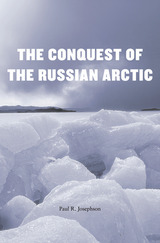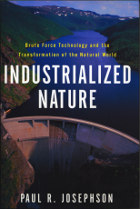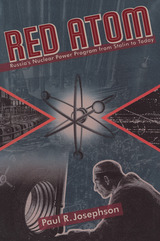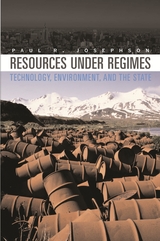
Spanning nine time zones from Norway to the Bering Strait, the immense Russian Arctic was mostly unexplored before the twentieth century. This changed rapidly in the 1920s, when the Soviet Union implemented plans for its conquest. The Conquest of the Russian Arctic, a definitive political and environmental history of one of the world’s remotest regions, details the ambitious attempts, from Soviet times to the present, to control and reshape the Arctic, and the terrible costs paid along the way.
Paul Josephson describes the effort under Stalin to assimilate the Arctic into the Soviet empire. Extraction of natural resources, construction of settlements, indoctrination of nomadic populations, collectivization of reindeer herding—all was to be accomplished so that the Arctic operated according to socialist principles. The project was in many ways an extension of the Bolshevik revolution, as planners and engineers assumed that policies and plans that worked elsewhere in the empire would apply here. But as they pushed ahead with methods hastily adopted from other climates, the results were political repression, destruction of traditional cultures, and environmental degradation. The effects are still being felt today. At the same time, scientists and explorers led the world in understanding Arctic climes and regularities.
Vladimir Putin has redoubled Russia’s efforts to secure the Arctic, seen as key to the nation’s economic development and military status. This history brings into focus a little-understood part of the world that remains a locus of military and economic pressures, ongoing environmental damage, and grand ambitions imperfectly realized.

The construction of the Three Gorges Dam on China's Yangtze River. The transformation of the Amazon into a site for huge cattle ranches and aluminum smelters. The development of Nevada's Yucca Mountain into a repository for nuclear waste. The extensive irrigation networks of the Grand Coulee and Kuibyshev Dams. On the face of it, these massive projects are wonders of engineering, financial prowess, and our seldom-questioned ability to modify nature to suit our immediate needs. For nearly a century we have relied increasingly on science and technology to harness natural forces, but at what environmental and social cost?
In Industrialized Nature, historian Paul R. Josephson provides an original examination of the ways in which science, engineering, policy, finance, and hubris have come together, often with unforeseen consequences, to perpetuate what he calls "brute-force technologies"—the large-scale systems created to manage water, forest, and fish resources. Throughout the twentieth century, nations with quite different political systems and economic orientations all pursued this same technological subjugation of nature. Josephson compares the Soviet Union's heavy-handed efforts at resource management to similar projects undertaken in the United States, Norway, Brazil, and China. He argues that brute-force technologies require brute-force politics to operate. He shows how irresponsible—or well-intentioned but misguided—large-scale manipulation of nature has resulted in resource loss and severe environmental degradation.
Josephson explores the ongoing industrialization of nature that is happening in our own backyards and around the world. Both a cautionary tale and a call to action, Industrialized Nature urges us to consider how to develop a future for succeeding generations that avoids the pitfalls of brute-force technologies.

In the 1950s, Soviet nuclear scientists and leaders imagined a stunning future when giant reactors would generate energy quickly and cheaply, nuclear engines would power cars, ships, and airplanes, and peaceful nuclear explosions would transform the landscape. Driven by the energy of the atom, the dream of communism would become a powerful reality. Thirty years later, that dream died in Chernobyl. What went wrong? Based on exhaustive archival research and interviews, Red Atom takes a behind-the-scenes look at the history of the Soviet Union's peaceful use of nuclear power. It explores both the projects and the technocratic and political elite who were dedicated to increasing state power through technology. And it describes the political, economic, and environmental fallout of Chernobyl.

Democratic or authoritarian, every society needs clean air and water; every state must manage its wildlife and natural resources. In this provocative, comparative study, Paul R. Josephson asks to what extent the form of a government and its economy--centrally planned or market, colonial or post-colonial--determines how politicians, bureaucrats, scientists, engineers, and industrialists address environmental and social problems presented by the transformation of nature into a humanized landscape.
Looking at the experiences of the industrialized and industrializing world, Resources under Regimes explores the relationship between science, technology, and the environment. Josephson considers global responses to deforestation, water pollution, and global warming, showing how different societies bring different values and assumptions to bear on the same problem, and arrive at different conclusions about the ideal outcome and the best way of achieving it. He reveals the important ways in which modern governments facilitate power generation, transportation, water production, and other technologies that improve the quality of life; and the equally critical ways in which they respond to the resulting depredations--the pollution, waste, and depletion that constitute the global environmental crisis at the beginning of the twenty-first century.
READERS
Browse our collection.
PUBLISHERS
See BiblioVault's publisher services.
STUDENT SERVICES
Files for college accessibility offices.
UChicago Accessibility Resources
home | accessibility | search | about | contact us
BiblioVault ® 2001 - 2024
The University of Chicago Press









